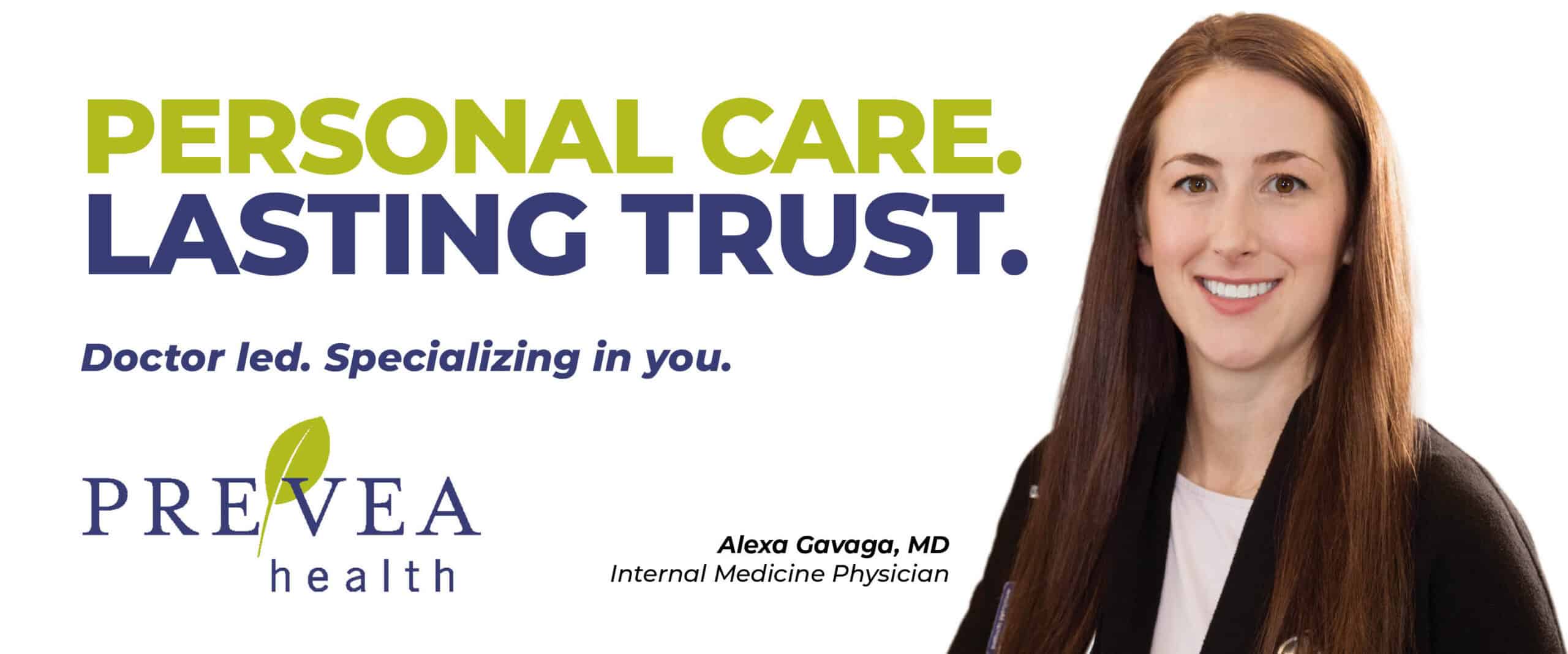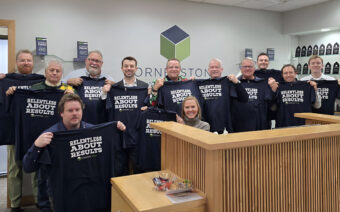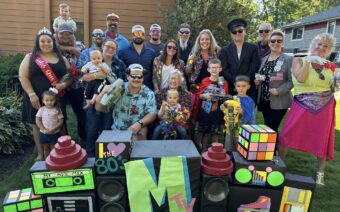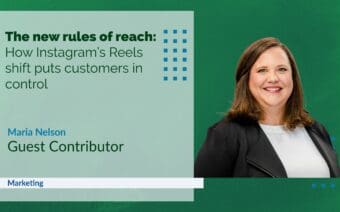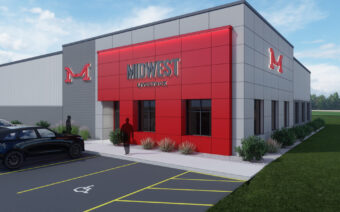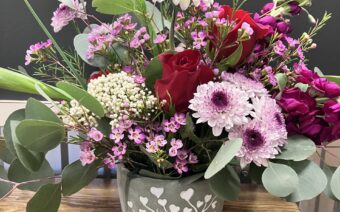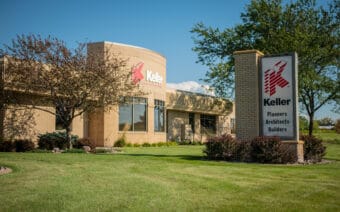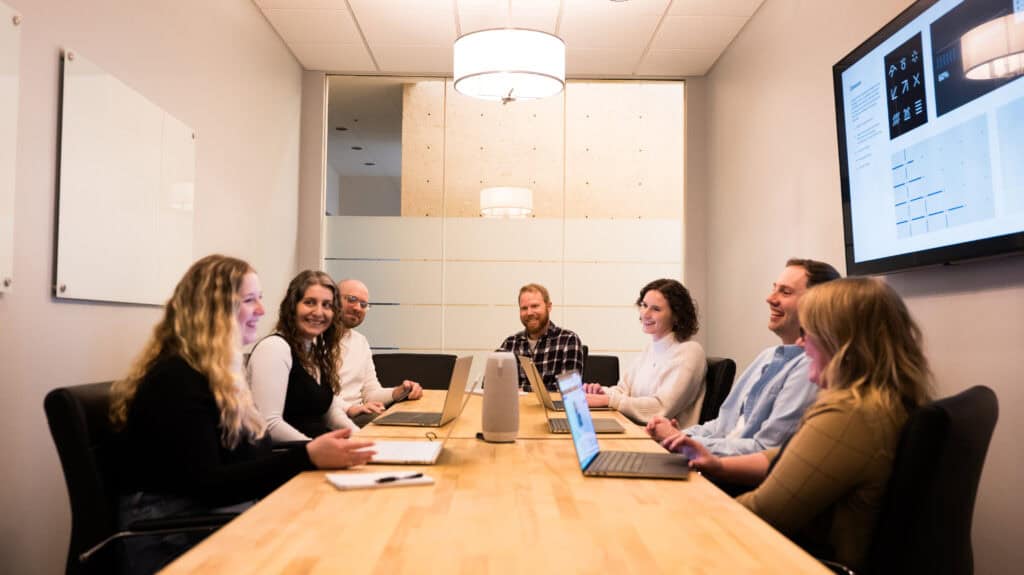
April 7, 2025
OSHKOSH – A decade ago, Ryan Albers and Josh Tyner – both with years of creative field experience under their belts and both working as in-house professionals for different companies – decided it was time for them to “utilize their full potentials” and start their own agency.
In the years since, Albers said Quill Creative Studio (101 City Center in Oshkosh) has grown:
- In staff – expanding from just the two of them in the first nine months to a team of seven creatives
- In clients – growing its customer base to more than 200
- In award-winning projects – taking home more than 97 state and national awards
Instead of individually searching for the culture each of them wanted in a company, Albers said he and Tyner decided to create their own with Quill.
“When you’re in the creative industry, it’s not math, it’s not science – there is never one right answer,” he said. “The fun of that is that you get to debate with your team, you get to critique and you have discussions as a team. And then as a team, you come together with what you think is the most viable option. It’s a fun and rewarding process.”
Today, Albers said the Quill team is made up of him (partner/brand strategy director), Tyner (partner/creative director), Arden Helm (partner/senior art director), Karen Patten (art director), Alice Huntley (senior designer), Dana Wolff (designer) and Lauren Fencl (designer).
“An environment that has an open-minded, leave-your-ego-at-the-door-type culture, is what Josh and I had as a vision for the company,” he said. “We figured it was best for us to start something from scratch and have control of that environment where everyone’s ideas are heard.”
As a creative services agency, Albers said Quill focuses on three main areas of focus – brand strategy, brand identity and brand support.
“They are kind of like three legs of a stool,” he said.
Within each of them, then, Albers said, are a plethora of options – including graphic design for logos and visual identities, attention-grabbing slogans and taglines, branded promotional collateral and trade show materials and packaging design.
Each focus, Albers said, is as important as the next, and has supported the company’s continued growth over the last decade.
Brand strategy
When discussing brand strategy with clients, Albers said words from Abraham Lincoln ring true – noting the late president once said if he had an hour to chop down a tree, he would spend the first 45 minutes sharpening his axe.
The Quill team, he said, understands that uncovering and highlighting an organization’s distinctive qualities is a critical first step in rebrands, brand launches and all branding projects.
“We have to start with a strategy, with the research, understanding your customers, understanding your competition – so that we can get a good grasp on where you want to take the organization, and then help you understand if that is differentiated enough so that we can position this brand in a unique space in the market,” he said.
Albers said it’s about finding a client’s North Star and establishing its voice and tone from there.
Brand identity
The information gathered and discovered during brand strategy, Albers said, then informs brand identity.
Building a strong brand identity, he said, is essential for any business or organization.
“That’s where we get into the applicable usages of core messaging that brand tone and voice,” he said. “(It also includes) visual identity development – colors, textures, fonts, iconography, logos.”
Because the Quill team starts with a strategy before jumping into brand identity, Albers said the first try is typically the final try.
“When we showcase a visual identity solution, way more often than not, there isn’t a need for rounds of revision,” he said. “We just go right into creating a brand guide and working on activation.”
Brand support
When it comes to brand support, Albers said the Quill team “acts as if it is an in-house design resource for clients.”
“So, we are helping them with understanding what to prioritize when it comes to collateral – is it just brochures and ad sheets, or a presentation deck or vehicle wraps?” he said. “(Discussing) the best way to apply their brand identity to meaningful touchpoints and collateral pieces – and then how to implement them.”
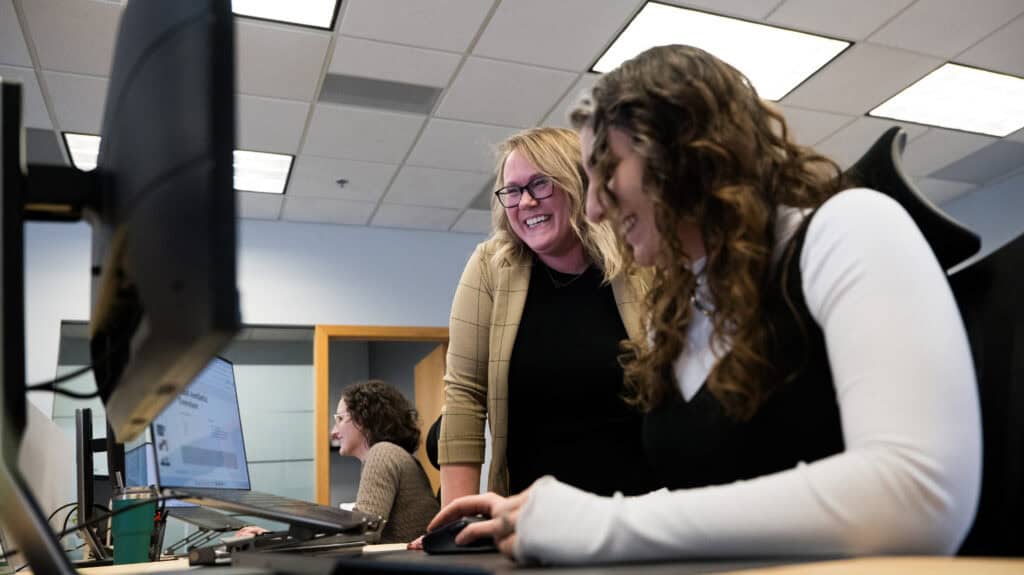
Because the team has built the client’s brand and “digested their brand guide,” Albers said they understand what needs to be done.
Consistency, Albers said, is key to maintaining brand recognition.
What that looks like for Quill clients, he said, varies depending on the needs of each – which is why the agency offers a wide range of support services.
10 years and counting
The last 10 years, Albers said, have provided him, Tyner and the rest of the Quill Creative Team a variety of lessons – each of which has helped shape the agency into what it is today.
Behind every logo, campaign and rebrand, Albers said, has a story – all of which has supported the agency’s culture and mission.
Lesson 1: Creativity makes the world go round
Where creativity meets business, Albers said, is where he gets excited.
“Companies or organizations that understand that people are not just looking for a product to check the box – they’re looking to join into a community or something that means something deeper than just the product (are those succeeding),” he said. “Brands that understand that, and leverage it, create an opportunity for somebody to be part of something more – and that drives the economy.”
Over the past decade, Albers said the Quill team has seen firsthand how clients across all industries share one common thread – a drive to create something meaningful, unique and true to who they are.
“Everybody would love to reinvent themselves at some moment of their life, and with a brand, you can do that,” he said. “You can give yourself a makeover and kind of squash the negativity that’s been in the past, or position yourself for an ideal future. And that’s where I love seeing that creativity come into the world of business.”
Lesson 2: All it takes to begin is a vision
When an idea plants itself into someone’s brain, Albers said it often refuses to let go – especially if it’s a good one.
This, he said, is exactly where the beginning of Quill happened – as an idea.
Albers said he and Tyner first crossed paths when they were graphic designers at the same company – recognizing pretty quickly they both had similar views on their ideal work culture.
“We didn’t want to search for it, so we eventually decided to build it instead,” he said.
By 2014, Albers said Tyner was ready to make the entrepreneurial leap and start his own agency and registered Quill Creative’s LLC.
“He opened a little office in downtown Oshkosh, and that was right at the height of him being a contractor for Oshkosh Defense, working in their bid and proposal department,” Albers said.
Initially, Albers said he asked Tyner if he could work in the office under the brand with his freelance business.
“In the first couple of months, I started earning enough money and bringing in enough clients to pay my mortgage,” he said.
Before too long, Albers said Tyner offered him an ownership stake and he, too, made the leap.
“When it first started, it was started as Quill Creative Marketing, and we were offering a lot of pseudo-marketing services,” he said. “Then Oshkosh Defense gave us a great opportunity to be their design resource for its bidded proposal department. That was our first big contract that allowed us to really launch the business and make some hires.”
Spending the first several years in the Pabst Square office building, Albers said Quill relocated to its City Center location in 2022.
“The space that we were in (originally) was very compartmentalized, and that didn’t support the idea that we wanted to be working collaboratively all the time,” he said. “We wanted to be looking over each other’s shoulders and seeing what each other is working on.”
Quill’s new location, Albers said, is within walking distance of “all the great things that are happening right now in downtown Oshkosh.”
“It’s growing, and the community is investing in downtown,” he said. “The BID does a great job, the CBD does a phenomenal job – and we want to be part of that revitalization of downtown. And we branded a few businesses that are downtown.”
Lesson 3: The right people make all the difference
Albers said he and Tyner are firm believers in slow steady growth and making the right decision once.
This philosophy, he said, has served as its foundation for company growth.
“When we see that we’re getting really backed up, or the demand for rebrands and brand support is starting to exceed what our team is capable of doing, we’re first going to look at how can we be built more efficient,” he said, “and then we’re going to look at who do we need to bring to the team to best alleviate pressure.”
Albers said, again, that doesn’t always mean hiring a new employee but looking within to see where opportunities lie for promotion or responsibility advancement.
“A couple of years ago, we implemented what we call our Studio Model, which is (a framework for) how we create teams for each of the accounts that we have,” he said. “That team is armed with an art director and a designer and a strategist.”
Having the right people in the mix and scaling the agency “slowly and sure-footedly,” Albers said, has been the plan of attack for Quill from the beginning.
“We could have hired three designers all at a time and just kept trying to sell, sell, sell,” he said. “But the fear with that is there would be a blip in quality, and we’ve never had a blip in quality. I don’t want to have any sort of reputation where anybody could say that we had a misstep. So, slow, steady, sure-footed growth (has been our focus). We’re not looking to turn into a 100-person agency in the next couple of years. We want to make sure that quality reigns supreme.”
Lesson 4: It’s about relationships, not transactions
With Tyner’s previous relationship with Oshkosh Defense helping serve as a launching point for the future of Quill, Albers said it was just the start of the agency’s focus on creating long-lasting relationships, not sales transactions.
“It’s definitely the service over the sale, and that has allowed us to then fan out within an organization,” he said. “By doing good work at one place, more and more people see it and they request to work with you. That’s allowed us to fan into multiple segments within the Oshkosh Corporation family of brands, and then also multiple departments within each of those segments.”
Each project completed successfully for a client by the Quill team, Albers said, has served as inspiration for others.
“We will be brought into companies, either because they heard about us, somebody referred them to us or somebody moved from one organization to another, and then they called on us when they’re at their new company,” he said.
At Quill, Albers said it’s never just been about sealing deals and signing contracts – but rather about connecting with people “who have a vision and a story and being trusted to help bring that story to life.”
“We have a firm belief in ‘be where the client needs, add value, but don’t sell them on anything that’s not necessary,’” he said.
Lesson 5: Figure out what you’re good at, and do more of it
Within the first two years of Quill, Albers said he and Tyner “fell in love with” the visual identity and brand development projects.
“It wasn’t long, probably in our third year, when Josh and I had a conversation and said, ‘Let’s specialize. Let’s put all of our eggs in one basket and get really specialized. Let’s chase what we love doing the most and build the team around that,’” he said.
Though the pair decided to niche down the agency’s focus of services – specializing in brand strategy, identity and support – Albers said they made the intentional decision to keep its target market-wide.
“That allowed the team to strengthen our skills and in all different aspects of industry,” he said.
Once “they dove headfirst into” brand strategy and visual identity design, Albers said it was a “real eye-opening moment,” for him, for Tyner and the trajectory of Quill.
“Because we specialize, we’ve built partnerships with other studios and agencies – such as agencies that specialize in digital marketing and or specialize in web development,” he said. “We then come together, all being the experts in our own lane, and we work together to give a client that whole in-house sort of experience.”
Albers said something every organization should do at some point is reflect on “how do we simplify and amplify our impact?”
“For us, it’s helping create beautiful designs for brands that are worth it,” he said. “If you can get down to a very simple thing that you want to be known for, and then do everything in your power to further that perspective that people have on you – (that’s helping make meaningful change).”
Lesson 6: Adapt or get left behind
Albers said “you don’t know what you don’t know,” and when starting a business “you have a lot of blind spots.”
What has proved successful for him and Tyner, Albers said, has been keeping an open mind and leaning on the lived and learned experiences of mentors.
With much of the work that Quill does taking place on computers and through computer programs, Albers said a key to the agency’s success has been adapting to new and improved features and functions as they are introduced.
Even the process of speaking with clients, Albers said, has changed significantly over the past decade, especially during and after the COVID-19 pandemic.
“We used to spend time in the car every day, running from meeting to meeting,” he said. “COVID, of course, kind of pushed everybody in the direction of video conference calls. Now, we work seamlessly with clients in Canada and from coast to coast through video conferences.” Leveraging technology and tools, Albers said, has allowed Quill Creative Services to expand its reach and “then be more efficient to make the most of everybody’s investment.”
Lesson 7: Community success is our success
Supporting the community that helped Quill “get our feet under us,” Albers said, has been an important part of the company’s culture since the beginning.
“To be able to contribute back to a community, have meaningful impact on it and see a community flourishing – and know that you had even a little bit of (a hand that) – is very, very rewarding,” he said.
Albers said being a part of a community is about more than doing business in it, but rather being an active member of it.
To date, he said Quill has contributed $134,875 of in-kind work for nonprofits, and partnered with community changemakers and local organizations.
Albers said Quill has closely collaborated with organizations like the Oshkosh Kid’s Foundation and the Children’s Cancer Family Foundation.
“We do a lot of work with the Children’s Cancer Family Foundation’s big fundraising events,” he said. “When you go to those events, it’s incredible to know that we’ve been able to share our talent to make somebody’s life a little brighter.”
Lesson 8: It’s okay to self-congratulate
Just as the Quill team encourages its clients to “give themselves a pat on the back now and again,” Albers said he and Tyner recognize the importance of doing that for themselves as well.
“Your brand lives external, and it also lives internal,” he said. “Your employees have a brand experience – whether it’s a big win like a recognized award or a small win like a project (that) got completed.”
Though humble, Albers said it’s important for companies to “celebrate those wins.”
“We’re letting people know that we do great work, because people want to bet on a winning horse, and you have to let them know that you have a great track record,” he said.
Over the years, Albers said Quill has won a variety of industry awards and its projects and staff have been recognized in both GDUSA Magazine and Inc. Magazine.
Most recently, he said Quill took home four ADDY awards at the region’s annual awards ceremony.
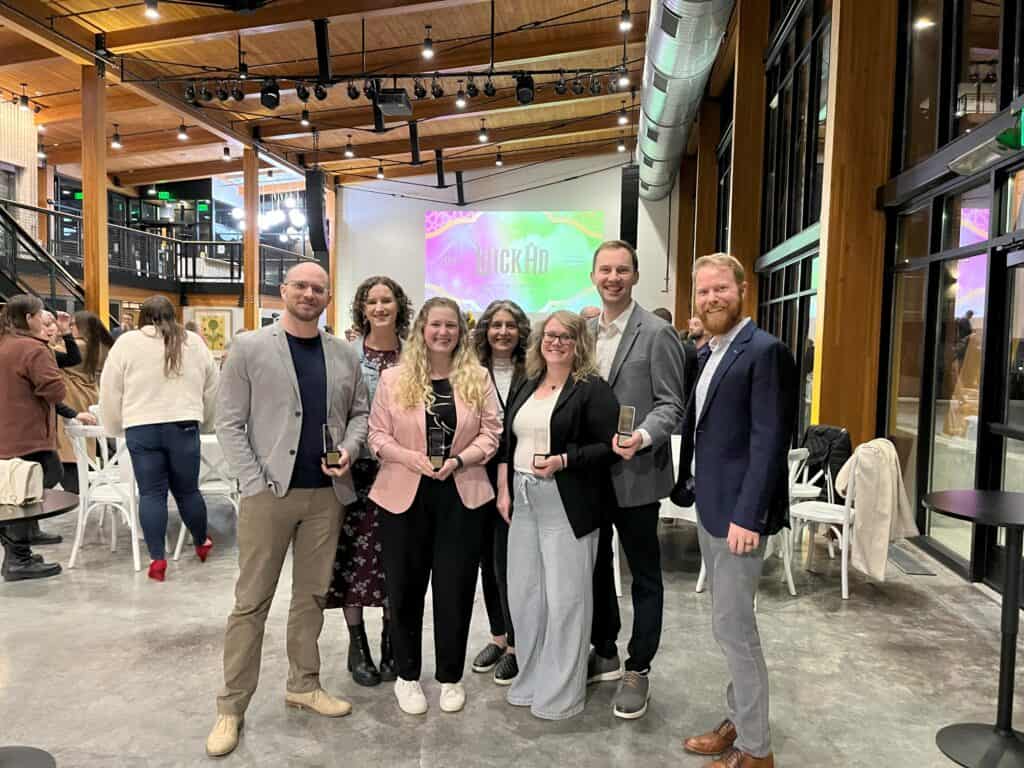
Albers said this is the first year Quill has submitted projects for ADDYs.
“Out of the five projects that we submitted, four of them won ADDYs,” he said. “The fifth won an honorable mention. So, all of them were recognized, which was great to see.”
Lesson 9: Gratitude never goes out of style
Albers said the Quill team says “thank you” to its clients a lot.
“We thank them for trusting us and for working with us,” he said. “This is an industry where you really need to trust who you’re working with, because they are going to help you paint the perception that the public is going to have of your organization. And we get a lot of people trusting us, and we thank them for that.”
Albers said he and Tyner also often thank their team for putting in the work to continually create successful projects.
“Our team puts extra thought into things,” he said. “Instead of just cranking out a request, because it seemingly was easy, (they) realize that, ‘hey, I think the client actually needs something a little different to really hit the goal of this project.’ Our team puts in that thought, and we thank them for that.”
Word-of-mouth referrals, Albers said, have been Quill’s No. 1 source of attracting work since the beginning.
“Every single customer, every single employee (provides) an opportunity to create a brand ambassador for you,” he said. “So, if you give an employee a wonderful experience – if you give the customer a wonderful experience – they might tell somebody. If you give them a bad experience, they’re going to tell everybody.”
Lesson 10: Never stop evolving
Though the Quill team is taking the time to celebrate the growth and success the company has had in the last decade, Albers said they are already looking to the next 10 years.
Though the agency will continue to add tools, technology and techniques as they become available, Albers said “our whole goal is to create more impact.”
“I’m planning on doing more speaking engagements on a national level – going to seminars and workshops and things like that,” he said.
And though the continued focus of Quill will be specialized, Albers said the team plans to continue to “sharpen that axe” so the team can make the biggest impact for its customers.
“What we’ve learned working with small businesses, we’ve been able to apply to large businesses, and vice versa,” he said.
Albers said they plan to expand Quill services a little bit in terms of research.
“We want to further our research (and) do deeper research to better inform strategy,” he said. “We are also starting to offer some web development services.”
Albers said Quill has offered website design services for quite some time and would partner with another company to develop it.
“We have now started to tiptoe into web development,” he said. “And, like with everything, we are doing it slowly, steadily, making sure that we don’t ever over promise and under deliver.”
What won’t ever change, Albers said, is Quill’s steadfast commitment to “creativity, collaboration and delivering top-tier design that takes businesses where they want to go.”
For more on Quill Creative Studio, visit quillcreativestudio.com.
 3Elephants & Company never forgets ‘hometown feel’
3Elephants & Company never forgets ‘hometown feel’ New owners at the helm of Tribute Brewing Company
New owners at the helm of Tribute Brewing Company

